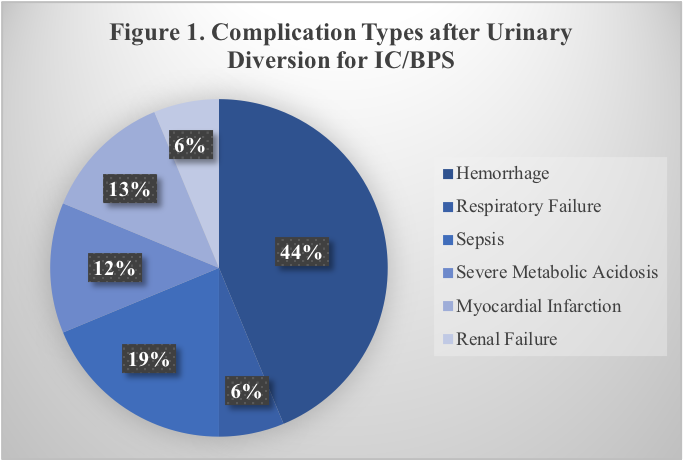Back
Poster, Podium & Video Sessions
Podium
Infections/Inflammation/Cystic Disease of the Genitourinary Tract: Interstitial Cystitis
PD08-02: Urinary diversion for interstitial cystitis/bladder pain syndrome: Prevalence and perioperative complication rate
Friday, May 13, 2022
9:40 AM – 9:50 AM
Location: Room 244
Paige Kuhlmann*, Los Angeles, CA, Kai Dallas, Duarte, CA, Peris Castaneda, Victoria Scott, Los Angeles, CA, Jennifer Anger, San Diego, CA, Karyn Eilber, Los Angeles, CA
- PK
Paige K. Kuhlmann, MD
Resident
Podium Presenter(s)
Introduction: Urinary diversion is a last resort (sixth-line) option for interstitial cystitis/bladder pain syndrome (IC/BPS). However, its real-world frequency and post-operative sequelae are not well characterized. We aimed to determine the frequency of and rates of perioperative complications after urinary diversion for IC/BPS patients in a large population-based dataset.
Methods: All patients undergoing urinary diversion, cystectomy or bladder augmentation strictly for IC/BPS in California from 01/2012-12/2018 were identified from the Office of Statewide Health Planning and Development datasets using appropriate ICD-9/10 and CPT codes. Associations between demographics, concomitant procedures (cystectomy vs. bladder sparing), post-operative length of stay, and post-operative complications were assessed using the chi-square and Student’s T-tests.
Results: Of the 25,000 urinary diversion, cystectomy or bladder augmentations identified, only 35 women underwent urinary diversion for IC/BPS. Concomitant cystectomy was performed in 26 of these women (74%), bladder augmentation in 6 (17%), and diversion alone in 3 (9%). Mean patient age was 60.3 years, with the youngest patient being 23 years. Mean length of stay post-operatively was 10.5 days. Of 35 patients, 16 (46%) experienced a major complication (Clavien-Dindo grade 3-5). Relative frequency of complication types are illustrated in Figure 1. All of these occurred in patients who had undergone cystectomy, yielding a 62% major complication rate in the cystectomy cohort, compared to 0% in the augmentation cohort (p=0.014). While the patients with complications were significantly older on average (66.8 vs. 54.9 years, p=0.02), younger patients were not spared with two of the 6 patients younger than 45 suffering a complication.
Conclusions: Urinary diversion for IC/BPS is rarely performed and carries a high major complication rate when done concomitantly with cystectomy (62%). Major complications after cystectomy for malignancy are reported in 10-20% of patients. Bladder cancer literature shows a strong association between surgical volume and outcomes, which may explain why complications are seen more frequently for this rare intervention in benign disease.
Source of Funding: n/a

Methods: All patients undergoing urinary diversion, cystectomy or bladder augmentation strictly for IC/BPS in California from 01/2012-12/2018 were identified from the Office of Statewide Health Planning and Development datasets using appropriate ICD-9/10 and CPT codes. Associations between demographics, concomitant procedures (cystectomy vs. bladder sparing), post-operative length of stay, and post-operative complications were assessed using the chi-square and Student’s T-tests.
Results: Of the 25,000 urinary diversion, cystectomy or bladder augmentations identified, only 35 women underwent urinary diversion for IC/BPS. Concomitant cystectomy was performed in 26 of these women (74%), bladder augmentation in 6 (17%), and diversion alone in 3 (9%). Mean patient age was 60.3 years, with the youngest patient being 23 years. Mean length of stay post-operatively was 10.5 days. Of 35 patients, 16 (46%) experienced a major complication (Clavien-Dindo grade 3-5). Relative frequency of complication types are illustrated in Figure 1. All of these occurred in patients who had undergone cystectomy, yielding a 62% major complication rate in the cystectomy cohort, compared to 0% in the augmentation cohort (p=0.014). While the patients with complications were significantly older on average (66.8 vs. 54.9 years, p=0.02), younger patients were not spared with two of the 6 patients younger than 45 suffering a complication.
Conclusions: Urinary diversion for IC/BPS is rarely performed and carries a high major complication rate when done concomitantly with cystectomy (62%). Major complications after cystectomy for malignancy are reported in 10-20% of patients. Bladder cancer literature shows a strong association between surgical volume and outcomes, which may explain why complications are seen more frequently for this rare intervention in benign disease.
Source of Funding: n/a


.jpg)
.jpg)